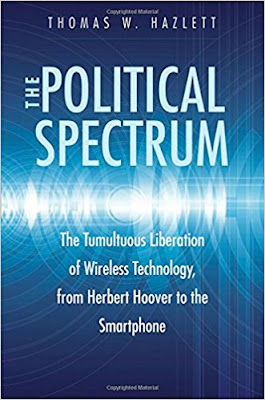So, how much of a
media geek am I? Last Sunday night (6/4) I was glued to C-SPAN for Brian Lamb’s
interview with Thomas Hazlett about his new book The Political Spectrum. For
a person like me who eats call letters for breakfast this hour of television is
as good as it gets.
Check out the
C-SPAN interview online here.
The Political Spectrum is about the intersection of the Federal Communications Commission (FCC), the electronic
media spectrum and political influence.
It
is the definitive work about how and why the FCC has made decisions regarding
radio, television, cable, the Internet and mobile devices.
These decisions have
made some people billionaires and other people paupers.
Hazlett’s new book is
filled with cases studies about how the FCC handles, and sometimes mishandles,
new and emerging technologies. With each new device and platform, the FCC rules
and policies must adapt existing practices. In many ways, the FCC is trying to
regulate and define “the genie in the bottle.”
Most FCC decisions
have been helpful to the growth of electronic communication industries but
there have situations when the FCC has stifled progress. Hazlett has plenty of
examples of both in The Political
Spectrum.
Thomas Hazlett is
uniquely qualified to explore these topics. In the early 1990’s he was Chief
Economist of the Federal
Communications Commission,
the person responsible for gaging the economic impact of FCC decisions. After
working for the FCC, he has devoted his work to education, research and
commentary on the impact of political decisions on government policy.
 |
| Thomas Hazlett |
Today Hazlett is the
H.H. Macaulay Endowed Chair in Economics at Clemson
University, where he also is director of the Information Economy Program [link].
He previously held faculty
positions at the University of California, Davis, Columbia University, the
Wharton School, and George Mason University School of Law.
Hazlett’s reporting
and commentary has appeared in the Wall Street Journal, New York
Times, The Economist,
Slate, Politico and Time.
Best of all,
Hazlett is a terrific storyteller with a wry sense of humor and irony. This
makes the book a fun, fast read.
SO, WHAT IS INSIDE THE POLITICAL SPECTRUM?
I haven’t received
my copy of the book yet so I am basing this review on what I heard and saw on
C-SPAN and other reviews.
Hazlett’s premise
is that while the FCC is necessary to regulate “the ether,” when applied to new
media, the higher the stakes, the higher for the potential of waste and
political backscratching.
His narrative
begins with the popular legend that the FCC’s predecessor, the Federal Radio
Commission (FRC) was established in 1927, the radio spectrum was in chaos, with
broadcasting stations blasting powerful signals to drown out rivals. This
situation led to ever-increasing federal regulation of electronic media to
impose necessary order. But, regulators pushed the FCC to block competition, impair
free speech and protect the powerful and politically connected owners of media.
In The Political Spectrum, Hazlett reports
how spectrum overseers produced a “vast wasteland” that they publicly
criticized but privately protected. His story recounts the losing battle by
Edwin Armstrong to establish FM, the untold story of how President Lyndon
Johnson’s family became rich by easily acquiring radio and television station
licenses and the FCC’s embrace of a HD Radio scheme that ignored common sense.
Hazlett’s book is
certain to enlighten and anger readers on the left and right. Here is a sample
of the reviews:
“Among [the] proponents of a
market for spectrum, none is more vocal and persuasive than …Thomas Hazlett….
Hazlett has done an extraordinary service demonstrating the harm of
government-managed spectrum.”
“Few understand spectrum, and
yet few things are more important to our networked future. Tom Hazlett covers
it all superbly. A monumental work.”
"Tom Hazlett describes
convincingly and clearly how federal regulation of the radio spectrum
epitomizes crony capitalism in the U.S. With colorful writing and
extensive research, The Political Spectrum demonstrates how spectrum regulation
provides politicians and regulators with a goody bag of campaign contributions
while in office and high-salaried jobs afterwards, all at the expense of the
general welfare."
The Politic Spectrum was released in late May 2017 and is
available from Amazon [link] and local booksellers.



No comments:
Post a Comment